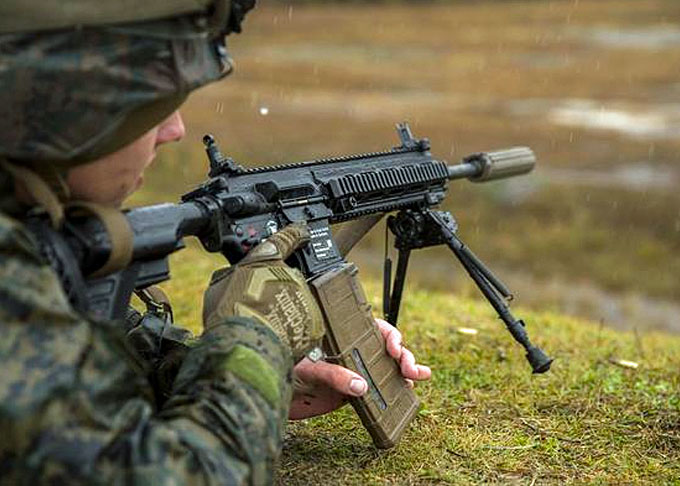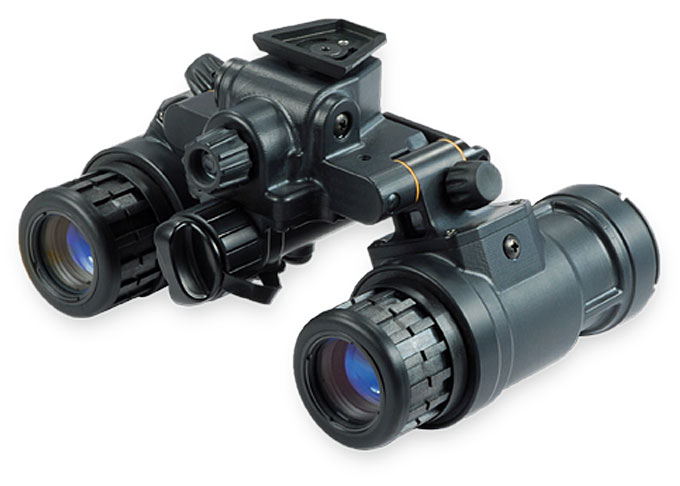
This article by Hope Hodge Seck originally appeared on Military.com, the premier source of information for the military and veteran community.
After more than a year of speculation, the word comes straight from the commandant of the Marine Corps: Grunts, including those outside the squad, are getting the M27 Infantry Automatic Rifle — and a whole lot of other goodies to boot.
Military.com first reported in November 2016 that the Marine Corps was eyeing the idea of fielding the weapon more broadly within the infantry, and had issued M27s to members of 3rd Battalion, 5th Marines, the service’s experimental infantry battalion, to observe how it improved their effectiveness.
(Marksmanship, the ability to shoot accurately and service targets with the minimum expenditure of ammunition, has always been part of the U.S. Marine Corps ethos. The adoption of the M27 Infantry Automatic Rifle [3] over the older M249 Squad Automatic Weapon marks a return to that ethos across the service at the small unit level. More accurate and capable of accomplishing its mission with fewer expended rounds, the M27 is now being considered as the front-line rifle not only for a handful of squad members but across the Corps’ front line units. Courtesy of US Military Today and YouTube. Posted on Dec 7, 2017)
Currently, the M27 is carried by only one member of each infantry fire team: the automatic rifleman.
With the battalion’s deployment to the Pacific at an end, Marine leaders are considering a list of 41 different recommendations generated by the unit, and M27s are at the top of the list.

In an interview with Military.com in late December, Commandant Gen. Robert Neller confirmed that a decision had been made to move forward with fielding the M27 more widely within the infantry.
Every Marine in an infantry squad, he said, will receive the high-end rifle.
And while not every Marine in a grunt battalion will carry the IAR, others outside of the squad will also be issued one.
“I don’t think mortars and javelin guys need the M27,” Neller said. But, he added, artillery forward observers, fire support teams, and even engineers might be good candidates for the weapon.
“I’m going to wait and see,” he said. “It’s not that much [money].”
The exact number of weapons needed has yet to be determined.
In February, the Marine Corps put out a request for information for 11,000 new infantry automatic rifles, enough to equip every squad.
But in August, the service published a pre-solicitation for up to 50,800 M27s, to ensure that manufacturer Heckler & Koch was up to the task of meeting an order that large.
(Marine Corps Systems Command is purchasing M27 IARs from a single source vendor based on feedback from Marines. The Corps plans to field the M27 more broadly in infantry units as early as 2018. Courtesy of Lance Cpl. Jamie Arzola, Bridget Bosch and YouTube. Posted on Aug 18, 2017)
Neller has in the past expressed reservations about investing in new weapons and technology for Marine grunts.
The IAR, based on the Heckler & Koch HK416, offers a longer effective range and better accuracy than the M4 carbine currently fielded to infantrymen, but it also has come with a steeper price tag: about $3,000 a piece compared to less than $1,000 for the M4.
That may no longer be the case.
Chief Warrant Officer 5 Christian Wade, the gunner for 2nd Marine Division out of Camp Lejeune, North Carolina, told Military.com that competition and economies of scale have pushed the cost of the M27 down significantly.
“The price for that rifle is comparable to what we paid for the M4s the riflemen currently have,” he said.
“These companies are competing against each other. And we now have bought the finest infantry rifle for the same price the current infantry rifle is.”
(The 5.56mm M27 Infantry Automatic Rifle has remained a favorite rifle of the Marine Corps for the better part of this decade. Based on the Heckler & Koch HK416 assault rifle and adopted in 2011 to replace the M249 Squad Automatic Weapon, it’s widely considered more versatile and accurate over a longer range than the average weapon. Courtesy of US Military Today and YouTube. Posted on Jan 7, 2018)
Kitting out the grunts
But with major Marine Corps investments for new rotary-wing and fixed-wing aviation platforms well underway, cost may not be the obstacle it once was for the service.
The commandant signaled his plan to invest heavily in the infantry when speaking with deployed Marines during his yearly Christmas tour.
The Marines’ new 5th-generation fighter, the F-35B Joint Strike Fighter, costs roughly $100 million per copy, Neller told troops at one of a dozen town hall-style addresses he gave in the span of seven days in late December.
“I could kit out every grunt in the Marine Corps with the coolest s*** head-to-toe for $100 million,” he said. “And I intend to do that.”
For what else may be coming for the infantry, look to the “Über Squad,” an experiment started this year by Wade.
This summer, the 13-Marine unit from 1st Battalion, 6th Marines, was kitted out with M27s, suppressors, and high-tech Ops-Core helmets borrowed from Marine Corps Special Operations Command that feature built-in hearing protection, but also magnify other sounds to improve situational awareness.

The Marines used light MARSOC body armor and advanced AN/PVS-31A night vision devices.
They also got 60-round Magpul drums, allowing them to increase the amount of ammunition they carried.
Wade said that the high-end night vision equipment had proved its worth recently during a nighttime exercise at Marine Corps Air-Ground Combat Center 29 Palms, California.
“That rifle squad moved faster at night than the live fire-safety chaperones,” he said.
“[The Über Squad moved too fast for them to keep up because they had better night vision goggles.”
The squad is expected to deploy to Europe sometime this spring to continue testing out gear, but Wade is already working on requirements documents as a starting point to get some of the equipment to every infantry squad.
He said he’s ready to begin writing requirements for a helmet with all the features of special operations gear, including hearing enhancement, communications infrastructure and ear protection.
Suppressors and scopes
Early efforts to pursue suppressors are also underway.
In September, the Marine Corps published a request for information about a commercially available suppressor that could be used on the M4, the M4A1, and the M27– effectively covering all service weapons used by the infantry.
While an early effort, the document instructed prospective suppliers to be ready to supply in large numbers.
(U.S. Marine Corps Chief Warrant Officer 5 Christian P. Wade, Division Gunner, 2nd Marine Division (2dMARDIV), explains the capabilities, effectiveness, and lethality of a suppressor while attached to Marine Corps small arms weapon system, near Camp Lejeune, N.C., May 6, 2017. The Gunner Fact or Fiction series dispels common myths and misconceptions regarding the true physical aspects of Marine Corps weapon systems. (Courtesy of Lance Cpl. Timothy Lutz, Bridget Bosch and YouTube. Posted on May 18, 2017)
“Future procurement quantities of suppressors could span between 18,000 and 194,000,” the RFI reads.
Wade said he’s not yet happy with the suppressor currently in use by the Marine Corps for specialized jobs.
He plans to start tests on a flow-through design that reduces signature, he said.
Add to all that one more key piece of gear: a variable power optic that, combined with the M27 and a suppressor, would essentially kit out every Marine in the squad as a designated marksman.
Wade said he wants to equip infantry squads from different platoons with various optics and compare their performance to make the case for more powerful equipment.
Currently, Marine grunts carry a 4X power rifle scope; Wade said the idea capability would be a 1-8X power scope.
An RFI published in September described such a scope, the “squad combat optic,” that would work on the M4, M4A1, and M27, and be able to identify and acquire targets at a range of 600 meters or more.
Some of this gear carries with it a sizable price tag.
The AN/PVS-31A NVGs, for example, cost about $13,000, compared with about $4,000 for the AN/PVS-14 NVGs currently in use.
(Learn More. Lucas Botkin and Drew Hopkins run a simple course of fire with night vision and kit. Shooting on the move in depth, width, and then barricade shots at distance on a C Zone steel. Courtesy of T.REX ARMS and YouTube. Posted on Jan 7, 2017)
And all of it isn’t guaranteed to end up with the squad.
But Neller said he’s likely to approve a lot of it, and soon.
“The money to buy all that other stuff, the suppressors, the ear protection enhancement, the different helmets, it’s not a lot of money in the aggregate,” he told Military.com.
“So I’m just waiting for them to come back, and I’m ready to say yes.”
And it’s possible all these items are just the start of a full-court press to equip the infantry for future fights.
In an address to Marines with the Black Sea Rotational Force in Romania, Neller hinted at future developments.
“Helmets, [ear protection enhancement], lighter body armor, boots, utilities, everything on the infantry from head to toe is probably going to get changed,” Neller said. “Every Marine’s a rifleman, but not every Marine’s a grunt.”
The infantrymen in the room roared.
Original post https://www.military.com/kitup/2018/01/05/m27s-and-head-toe-gear-overhaul-way-marine-grunts.html















